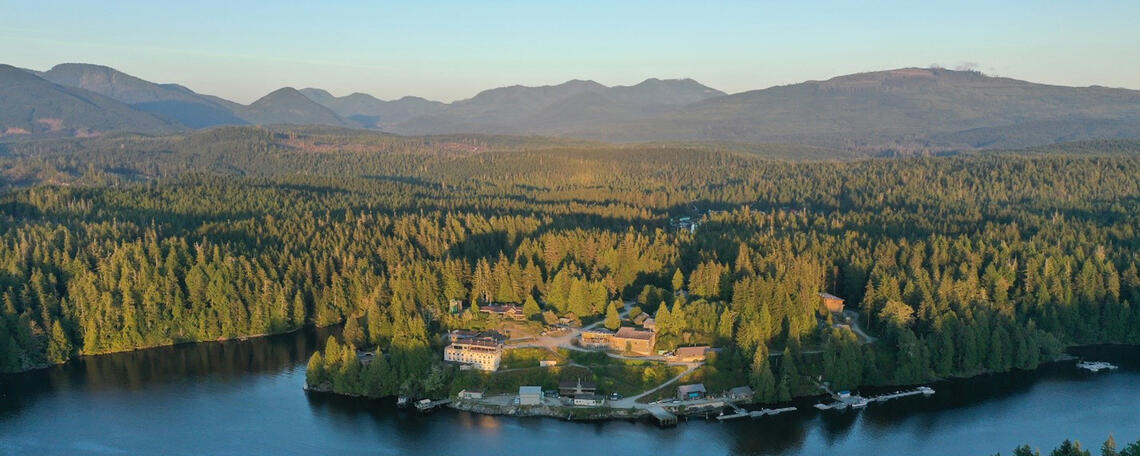
April 18, 2023
UCalgary students help to research and restore ocean kelp forests
The closest ocean might be about 700 kilometres away, but University of Calgary students are researching and helping to restore huge underwater forests off Canada's west coast, and support from Giving Day donors can help ensure these efforts continue into the future.
Every year, undergraduate and graduate students do marine research at the Bamfield Marine Sciences Centre (BMSC), a world-class research and teaching station on the outer west coast of Vancouver Island. The station provides ocean access in Barkley Sound to some of the richest marine biodiversity in the world.
UCalgary students who participate in the BMSC’s summer field program are typically in programs related to biology, oceanography, geography, historical archeology, environmental law and other disciplines. They’re engaged in place-based learning with the Huu-ay-aht First Nations in their traditional territories.
Some of the students’ research focuses on studying and restoring forests of kelp – species of large brown algae that grow in the cool and nutrient-rich waters along west-coast shorelines.

The Bamfield Marine Sciences Centre on the outer west coast of Vancouver Island.
“One of my favourite things is taking students from Calgary and Alberta to the ocean for the first time,” says Dr. Chris Neufeld, PhD, project lead for the Kelp Rescue Initiative and research scientist at the BMSC. “They come alive in this environment and they also get a lot out of the research experience.”

Dr. Sean Rogers, UCalgary professor and director of the Bamfield Marine Sciences Centre.
The Western Canadian Universities Marine Sciences Society, a charitable organization whose members include UCalgary, University of Alberta, University of British Columbia, Simon Fraser University and University of Victoria, was established the BMSC as a shared campus more than a half-century ago.
About two years ago, the BMSC’s 50-plus years of kelp research was formalized by creating the Kelp Rescue Initiative.
“The Kelp Rescue Initiative is the first research project under that multi-university umbrella charity where we can dedicate the focus solely to supporting kelp restoration,” says Dr. Sean Rogers, PhD, director of the BMSC, and a professor of ecology and evolutionary biology in the Department of Biological Sciences in UCalgary's Faculty of Science.
Finding solutions to kelp forests’ decline
The Initiative’s goal is to bring together a range of scientific expertise and Indigenous knowledge, with a mission to restore kelp forests on B.C.’s coast to secure resilient and vibrant ecosystems.
“The Kelp Rescue Initiative really is unique in how it’s bringing together the transdisciplinary approach and the strong partnerships with First Nations,” says Neufeld.

Dr. Chris Neufeld, project lead for the Kelp Rescue Initiative.
Kelp forests grow along more than one-quarter of the world’s coastlines and are among the planet’s most biodiverse ecosystems. These underwater forests provide food and shelter for hundreds of species, including rock fish, salmon, abalone and herring.
The fast-growing kelp (which can grow 25 centimetres in a day and reach heights of 35 metres) also plays a role in mitigating climate change, by protecting shorelines from erosion and sea-level rise and recycling carbon through the ecosystem. More research is still required to determine how much carbon that kelp is sequestering in deeper ocean waters, Neufeld says.
Studies by BMSC researchers and other scientists show kelp forests are declining in shorelines along the west coast.
“In places where we’ve done some really detailed work, like Barkley Sound, we’ve seen kelp disappear from about 40 per cent of the shoreline,” Neufeld notes.
Rapid declines of kelp forests occurred between 2014 and 2016, when a marine heatwave – nicknamed “the Blob” – warmed the Pacific Ocean’s surface and impacted the kelp, a temperate-water species.
The population of sea urchins has also ballooned since the heat wave after a disease killed about 95 per cent of sea stars, the sea urchins’ major predator. The expanding sea urchins then devastated their favourite food source – kelp.
Researchers at the BMSC, including UCalgary students, are studying how various kelp populations can be adapted to warmer versus cooler waters. Their work includes a focus on genomics, or the genetic aspects involved in adaptation.
BMSC scientists and students also are working to restore kelp forests using an approach known as “green gravel” kelp seeding. Pieces of baby kelp are attached to gravel and either tossed over the side of a boat or “out-planted” by divers on the ocean floor.
Kelp forest restoration projects, done in collaboration with First Nations on their traditional territory, are underway in Barkley Sound, as well as offshore from Hornby Island and in Vancouver Harbour near Stanley Park.
Giving Day donations will support student research and kelp restoration
UCalgary students who do research at the BMSC quickly recognize that the areas they work on – like restoring kelp forests – are global challenges, Rogers says.
“By being students at the University of Calgary, a top research university in Canada, they have the opportunity to be champions to solve these problems in that environment,” he says.
With University of Calgary Giving Day happening in April, donors can help UCalgary students to get a hands-on research experience at the BMSC, including restoring kelp forests.
“We’re asking for people to give to the Kelp Rescue Initiative specifically, so we can purchase an incubator (costing about $50,000) to grow baby kelp efficiently,” Rogers says. This incubator will be the main source for baby kelp for use in kelp forest-restoration projects along the west coast.
Giving Day donors “will support a research initiative that directly involves undergraduate and graduate students, and allows them to contribute to everything from the climate change challenge to the blue economy,” Rogers says.
UCalgary Giving Day is April 27. Whether you support student awards, critical research or any one of UCalgary’s innovative funds, your gift will help change lives and shape the future. All eligible gifts made from April 1-27 will be matched, dollar for dollar, up to $2,500 per gift, while matching funds last. Make your gift today at ucalgary.ca/givingday.











